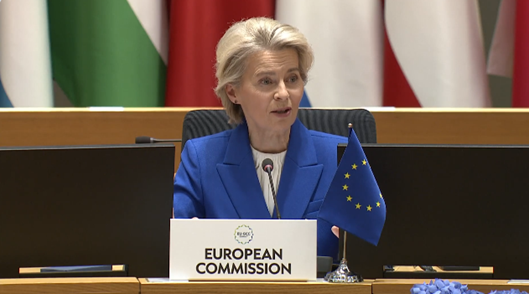
Hungary and Slovakia blocked the 18th sanctions package as Brussels is pushing the REPowerEU plan, which would ban member states from buying Russian gas and oil. Hungary claims that this move would put an end to its energy security.
“Iran has threatened to close the Strait of Hormuz, where 20 to 25% of global oil and gas passes. In such a fragile situation, any EU ban on energy imports could trigger a massive supply crisis. The EU Commission should drop RepowerEU entirely. Even mentioning it is irresponsible,” the minister of foreign affairs and trade of Hungary Péter Szijjártó said in a post on X.
The minister Szijjártó said the latest plans by European Commission president Ursula von der Leyen and Ukrainian president Volodymyr Zelensky involved banning Russian crude oil and natural gas purchases by Hungary, which would quickly result in an increase in utility fees.
Szijjártó warned that a plan drafted by Ursula von der Leyen and Zelensky would put an end to Hungary’s energy security.
He also told the Financial Times’ Energy Transition Summit in Athens that the RePowerEU roadmap for phasing out the European Union’s imports of Russian gas and oil by the end of 2027 would “ruin” Hungary, as the country couldn’t manage its energy supply without deliveries from Russia.
The foreign minister warned that, if the plan was implemented, the cost of Hungary’s energy supply would climb by an annual EUR 2bn, causing household utility bills to double or triple.
Minister Szijjártó said he agreed with representatives of the Russian government and the largest energy companies to maintain strategic cooperation in energy despite the efforts by Brussels and Kyiv to undermine this.
The minister said politicising issues around energy supply was “extremely harmful”, with an impact on European competitiveness as “gas costs several times in Europe as in America or China”. “If we continue like this, we will certainly not be competitive,” he warned, adding that Europe’s economic growth used to rest on modern western technologies and cheap energy from Russia. “By now, we have been cut off from Russian resources and there is no alternative,” he said.
To remind, the European Commission has put forward a legislative proposal to gradually and effectively stop the import of Russian gas and oil into the EU by the end of 2027.
The proposed regulation provides a stepwise phase-out of pipeline gas and liquefied natural gas (LNG) originating in or exported directly or indirectly from the Russian Federation. It also presents measures to facilitate the complete stop of Russian oil imports by the end of 2027.
Under the envisaged gradual import ban, Russian gas imports under new contracts will be prohibited as of 1 January 2026.
Imports under existing short-term contracts will be stopped by 17 June 2026, except those for pipeline gas delivered to land-locked countries and linked to long-term contracts which will be allowed until the end of 2027. Imports under long-term contracts will be stopped by the end of 2027.
Long-term contracts for LNG terminal services for customers from Russia or controlled by Russian undertakings will also be prohibited.
The EC detailed that the proposal includes steps for phasing out pipeline gas and liquefied natural gas (LNG), as well as measures to facilitate the complete stop of Russian oil imports by the end of 2027.
The European Commission noted that this is in line with the REPowerEU roadmap, the EU’s strategy to completely remove Russian oil, gas and nuclear energy imports from the EU markets, which the Commission adopted last month.
Iran has threatened to close the Strait of Hormuz, where 20 to 25% of global oil & gas passes. In such a fragile situation, any EU ban on energy imports could trigger a massive supply crisis. The @EU_Commission should drop RepowerEU entirely. Even mentioning it is irresponsible.
— Péter Szijjártó (@FM_Szijjarto) June 23, 2025
W/ Slovakia, we blocked the 18th sanctions package as Brussels is pushing the REPowerEU plan, which would ban member states from buying Russian gas & oil. This would undermine Hungary’s energy security & violate the Council decision granting us exemption from the Russian oil ban. pic.twitter.com/2NX17vJVl3
— Péter Szijjártó (@FM_Szijjarto) June 23, 2025


